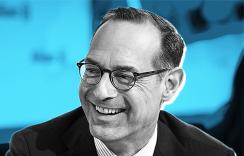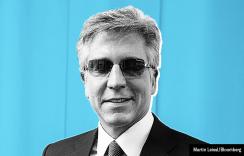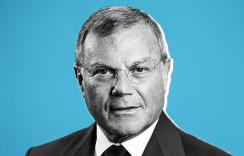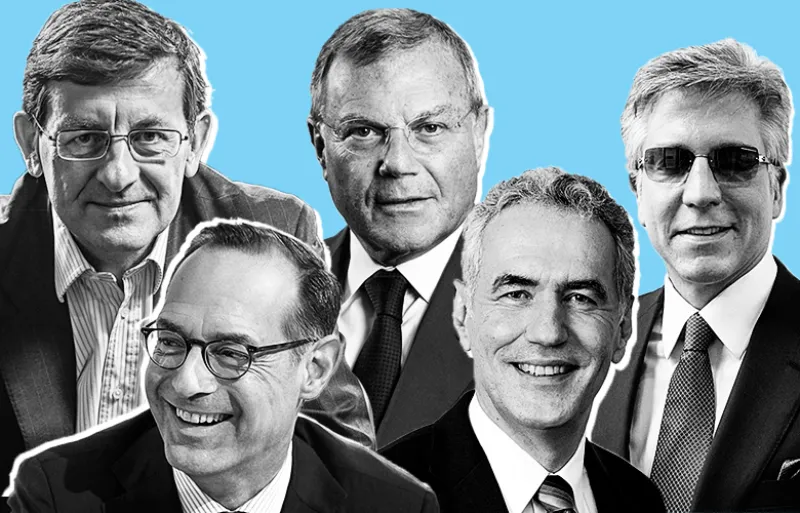The onslaught of new data-driven technology is giving Europe's top chief executives sleepless nights as much as it is expanding horizons.
The fourth industrial revolution will allow businesses to harness data that will enhance their understanding of consumer behavior, making processes leaner. In the insurance sector, Allianz is using voluntary trackers in cars to incentivize better driving as the industry pivots from one founded by regulators to one focused on customers. Other sectors will find business making and deploying infrastructure. Vodafone, for example, is laying gigabit fiber to bring superfast broadband to Germany.
But revolutions do not come without uncertainty. The CEOs selected by money managers and research analysts for Institutional Investor's 2018 All-Europe Executive Team are feeling their way through the adoption of new technology and hoping they make the right bets. They must battle the short-termism of activist investors who may not be prepared to wait around to see if innovations take off. Some, like Bill McDermott at business software provider SAP, are deploying their own funds to support startups with potential.
These chief executives also continue to keep a close eye on changes resulting from regulation and Britain's exit from the European Union. While the former is an ongoing negotiation, the latter is a waiting game. Many of the chief executives interviewed by II agree with Richard Ridinger of Lonza, who believes the impact of Brexit will be limited, especially in tech, where tariff-free trade is enshrined in a World Trade Organization agreement. Restrictions on the free movement of people may hit harder, especially in highly specialized professions. At advertising conglomerate WPP, 30 percent of its tech-focused companies are made up of E.U. nationals from outside the U.K. Chief executive Martin Sorrell says it is "absolutely critical" that the U.K. continues to welcome such talent.
All are seeking to provide clarity for clients in a tech landscape promising increasing complexity. In the words of Bill McDermott of SAP: "There is sophistication in simplicity."

Oliver Bäte, Allianz
Financial Institutions: Insurance
What's the biggest challenge facing the insurance sector right now?
Today's customers want the same customer experience they have with online retailers with insurance companies, plus high-touch personal service. To get this right is the biggest challenge facing our industry. Simplifying products and processes using digital tools will enable the industry to serve customers better. Data will help predict behavior more accurately, leading to a safer environment and better pricing, such as insurers offering voluntary trackers in cars to give lower prices to risk-averse customers.
How is Allianz being innovative?
Innovation at Allianz is happening everywhere. An example of customer interface innovation would be our motor claims app. It was developed by various Allianz entities at our Global Digital Factory. It's easy and provides customers coverage details, claims status, their Allianz agent - and of course emergency assistance.
Which non-family member has been your biggest influence?
At Allianz, undoubtedly my predecessors and bosses Henning Schulte-Noelle, Helmut Perlet, and Michael Diekmann have been crucial for my development.
How much will Brexit impact the insurance industry, and what is Allianz doing to prepare?
From a global perspective I am not worried for our industry. Also, Allianz with its global business in insurance and asset management won't see material impact. We do believe in the future of the British insurance sector, otherwise we wouldn't have invested more than £700 million ($971 million) in our joint venture with LV=.
How will 2018 be remembered?
Hopefully it will be remembered as a year of reconciliation. Europe will hopefully have agreed on steps to stay competitive in tougher global markets. China will have addressed financial stability issues. And, as always, Germany will strive to win the football world cup (unfortunately, Italy is not qualified).
Richard Ridinger, Lonza Group
Pharmaceuticals & Health Care: Biotechnology
What's the biggest challenge facing the biotechnology sector right now?
The biggest challenge facing the biotech sector is to find ways to bring new treatments faster to patients. As an industry we need to find a way to fast-track all processes, not just regulatory ones, in order to speed up the time to market to benefit patients globally.
How is Lonza Group being innovative?
We continue to invest over-proportionally in innovation so that customers see us as an industry leader in innovative solutions. Through our customer-focused innovations, we enable all biotech modalities that lead to new patient therapies. We also are leaders in developing and monetizing cutting-edge specialty ingredients, such as safe solutions to banned compounds.
Which non-family member has been your biggest influence?
Helmut Schmidt, former Chancellor of Germany, was my strongest influence as I was growing up. In fact, I voted for him in my first-ever election when I was 18. I admired him for his intellectual sharpness, his frame of values, and his individualism right up until his death.
How much will Brexit impact the biotechnology industry, and what is Lonza Group doing to prepare?
It is too early to quantify the exact effects of Brexit on Lonza's biotechnology, but we believe the impact will be limited. The U.K. will continue to be a major hub for biotechnology globally. We will, of course, monitor the effects closely.
How will 2018 be remembered?
We believe 2018 will be remembered as the year that we strengthened Lonza's leading role as a provider of valuable solutions for the global pharmaceutical and consumer healthcare markets, with a focus on patient health, consumer preventive health, and healthy consumer environment.

Bill McDermott, SAP
Technology, Media & Telecommunications: Technology/Software
What's the biggest challenge facing the technology sector right now?
The sheer volume of data in the world - and in our lives - is mind-blowing. The opportunities are immense, but when we ask CEOs to name their biggest challenge, most answer "complexity." We know that the simplest global brands outperform the major indexes by 330 percent - that's why we made "run simple" our operating principle. There is sophistication in simplicity.
How is SAP being innovative?
Our in-memory database solution, SAP HANA, has disrupted the industry, helping our customers revolutionize their tech landscape. Our digital innovation system - we call it SAP Leonardo - harnesses technologies like AI, machine learning, and blockchain to help companies become intelligent enterprises. Our SAP.iO unit invests in exciting digital startups, co-innovating and helping them scale globally.
Which non-family member has been your biggest influence?
I'm proud to say we stand on the shoulders of giants, none larger than our founder and chairman, Hasso Plattner. Hasso has been an immense influence on me personally, for his leadership, his vision, and his refusal to accept the status quo.
How much will Brexit impact the technology and software industries, and what is SAP doing to prepare?
Overall, the tech industry is well-positioned, partly due to WTO's Information Technology Agreement, which ensures the vast majority of world trade in IT products is tariff free. There are some concerns over maintaining data flows between the E.U. and the U.K. This could affect some U.K.-based tech companies which serve the E.U. market.
How will 2018 be remembered?
We will look back on 2018 as the year purpose-driven businesses triumphed. Purpose-led companies outperform the market by 10 to 15 times. Employees are 5 times more likely to stay at a company if they have a strong connection to their employer's purpose. The more business leaders pursue this strategy, the better.

Sir Martin Sorrell, WPP
Technology, Media and Telecommunications: Media
What's the biggest challenge facing the media and communications sector?
The greatest challenges are probably the long-term impact of technological disruption. In production, 3D printing and robotics; in media, the impact of digital giants on publishers and broadcasters; and in distribution, Amazon and Alibaba.
How is WPP being innovative?
Whether it's the expansion of leading digital agency Essence, the creation of technology and data spine [m]PLATFORM, our unique partnerships with marketing technology providers like Adobe, or the development of cross-group capabilities, we continue to lead the market in helping clients navigate a rapidly changing and complex landscape.
Which non-family member has been your biggest influence?
Philip Reiss, the senior partner at Davis & Gilbert, was as important to me personally as he was to the growth of WPP. He advised us on the acquisitions of J. Walter Thompson, Ogilvy & Mather, and Young & Rubicam. He was not only a great lawyer but a great friend, and almost like a brother to me. He was always ready to advise and help, he had incredible patience, and he was very giving of his time.
How much will Brexit impact the media and communications industries, and what is WPP doing to prepare?
Immediately after the referendum result, we said that WPP would become more European than ever. What we meant was that we would invest more in key Western Continental European markets in order to bolster our position. What I worry about is the longer-term impact not only on trade but on the U.K.'s attractiveness as a destination for talent.
How will 2018 be remembered?
In our industry, the theme of 2017 was the strength of Google and Facebook in digital advertising. The theme of 2018 will probably be the growing role of Amazon. Its significance for the communications services business is twofold. First, it is in the process of disrupting every sector it turns its sights on, including those of many of our clients; and second, it is making serious moves to become a force in search and advertising as well as e-commerce - perhaps the "third force" to challenge the Google and Facebook.

Vittorio Coloa, Vodafone Group
Technology, Media and Telecommunications: Telecommunications
What's the biggest challenge facing the telecommunications sector?
The rapid pace of development of both telecom and digital technology forces us to make investments and develop services without certainty over the commercial horizon, coupled with regulations that are designed mostly for national telecommunications markets when competition online is global and cross sector.
How is Vodafone being innovative?
We innovate on infrastructure, product, and service levels. This includes, for example, deploying Gigabit fibre in Germany, launching and leading in consumer and enterprise Internet of Things services - ranging from telematics for cars to trackers for pets in Europe - and deploying chatbots and AI to manage customers' enquiries in the U.K. or Italy. And then scaling these initiatives globally.
Which non-family member has been your biggest influence?
My commanding officers in the Mountain Troops Military School, who woke up first, walked up the mountains first, carried the same weight, ate last, and went to bed last.
How much will Brexit impact the telecommunications industry, and what is Vodafone doing to prepare?
Our operating companies are standalone, local businesses and each is able to adapt to a wide range of local conditions. As such, we do not expect that Brexit will have a significant impact on their ability to continue to serve customers in their respective markets, as long as Britain retains adequacy to E.U. data management and privacy rules.
How will 2018 be remembered?
For greater and greater demand for gigabit service in both mobile and fixed broadband, together with many new and surprising Internet of Things services invented and launched by companies of all sizes.







